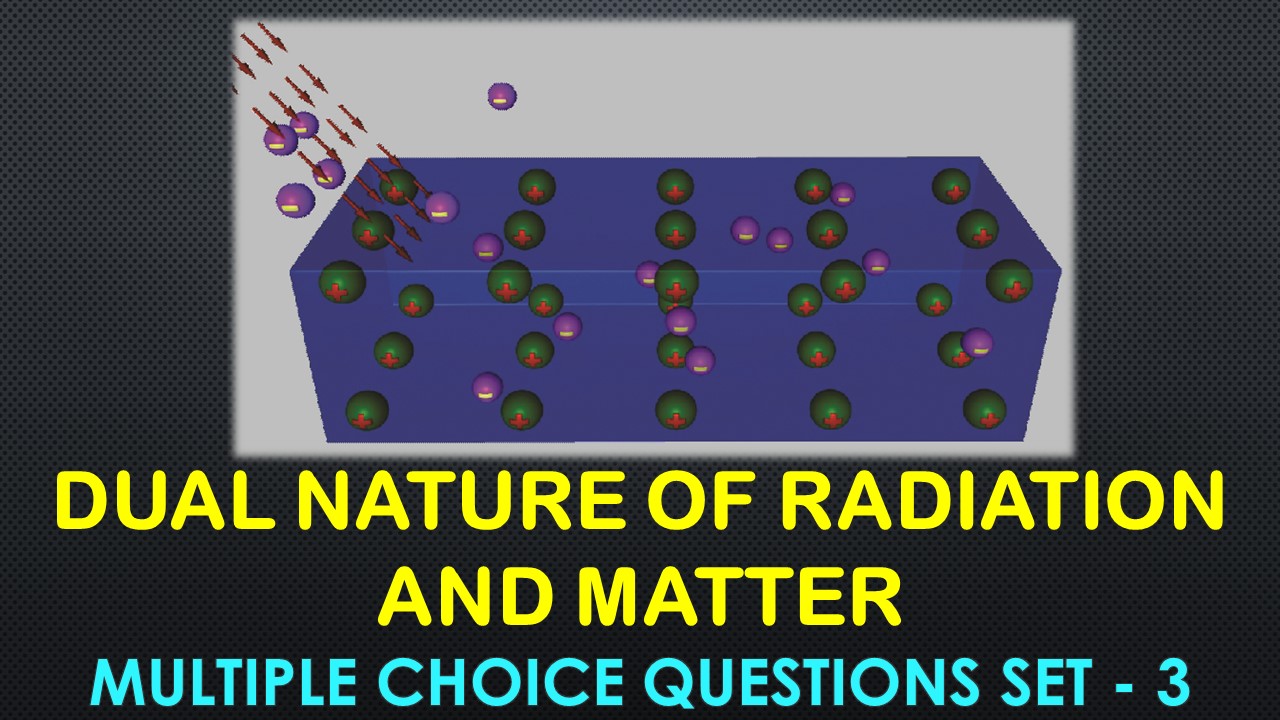CBSE Class 12 Dual Nature of Radiation and Matter Multiple Choice Questions with Answers. MCQ Questions Class 12 Dual Nature of Radiation and Matter with Answers Is Prepared Based on Latest Exam Pattern. Students can solve NCERT Class 12 Dual Nature of Radiation and Matter MCQs with Answers to know their preparation level.
Students who are searching for NCERT MCQ Questions for Class 12 Dual Nature of Radiation and Matter with Answers are compiled here to get good practice on all fundamentals. Know your preparation level on MCQ Questions for Class 12 Dual Nature of Radiation and Matter with Answers. You can also verify your answers from our provided MCQ Class 12 Dual Nature of Radiation and Matter with Answers. So, ace up your preparation with MCQ of Class 12 Physics Examinations.
MCQ Questions Class 12 Dual Nature of Radiation and Matter with Answers - Set - 3
Question 1:
What is the de-Broglie wavelength of an electron accelerated from rest through a potential difference of 100 volts?
(a) 12.3 Å
(b) 1.23 Å
(c) 0.123 Å
(d) None of these
Correct Answer – (B)
Question 2 :
In photo electric emission, for alkali metals the threshold frequency lies in the:
(a) visible region
(b) ultraviolet region
(c) infrared region
(d) far end of the infrared region
Correct Answer – (A)
Question 3 :
Millikan’s oil drop experiment makes use of:
(a) Stokes’ law
(b) Boyle’s law
(c) Gas equation
(d) Bernoulli’s theorem
Correct Answer – (A)
Question 4 :
The momentum of an electron that emits a wavelength of 2 Å. will be:
(a) 6.4 × 10-36 kgms-1
(b) 3.3 × 10-24 kgms-1
(c) 3.3 × 10-34 kgms-1
(d) none of these
Correct Answer – (B)
Question 5 :
The work function of photoelectric material is 3.3 eV. The threshold frequency will be equal to:
(a) 8 × 1014 Hz
(b) 8 × 1010 Hz
(c) 5 × 1010 Hz
(d) 4 × 1014 Hz
Correct Answer – (A)
MCQ Questions Class 12 Dual Nature of Radiation and Matter with Answers
Question 6 :
Which of the following radiations cannot eject photo electrons?
(a) ultraviolet
(b) infrared
(c) visible
(d) X-rays
Correct Answer – (B)
Question 7 :
X-rays are:
(a) deflected by an electric field
(b) deflected by a magnetic field
(c) deflected by both electric and magnetic fields
(d) not deflected by electric and magnetic fields
Correct Answer – (D)
Question 8 :
Name the scientists who first studied the passage of electricity through fluids to establish the electrical nature of matter:
(a)Millikan
(b) Planck
(c) Faraday
(d) Boyle
Correct Answer – (C)
Question 9 :
The strength of photoelectric current depends upon :
(a) angle of incident radiation
(b) frequency of incident radiation
(c) intensity of incident radiation
(d) distance between anode and cathode
Correct Answer – (B)
Question 10 :
In Thomson’s experiment number of parabola gives :
(a) the no. of electrons present in element
(b) the no. of proton present in element
(c) the no. of neutrons present in element
(d) the no. of isotopes of the element present
Correct Answer – (D)
- NCERT Solutions Class 11 Chemistry Chapter 1 : Some Basic Concepts of Chemistry
- NCERT Solutions Class 11 Chemistry Chapter 2 : Structure Of The Atom
- NCERT Solutions Class 11 Chemistry Chapter 3 : Classification of Elements and Periodicity in Properties
- NCERT Solutions Class 11 Chemistry Chapter 4 : Chemical Bonding and Molecular Structure
- NCERT Solutions Class 11 Chemistry Chapter 5 : States of Matter
- NCERT Solutions Class 11 Chemistry Chapter 6 : Thermodynamics
- NCERT Solutions Class 11 Chemistry Chapter 7 : Equilibrium
- NCERT Solutions Class 11 Chemistry Chapter 8 : Redox Reactions
- NCERT Solutions Class 11 Chemistry Chapter 9 : Hydrogen
- NCERT Solutions Class 11 Chemistry Chapter 10 : The s-Block Elements
- NCERT Solutions Class 11 Chemistry Chapter 11 : The p-Block Elements
- NCERT Solutions Class 11 Chemistry Chapter 12 : Organic Chemistry: Some Basic Principles and Techniques
- NCERT Solutions Class 11 Chemistry Chapter 13 : Hydrocarbons
- NCERT Solutions Class 11 Chemistry Chapter 14 : Environmental Chemistry



